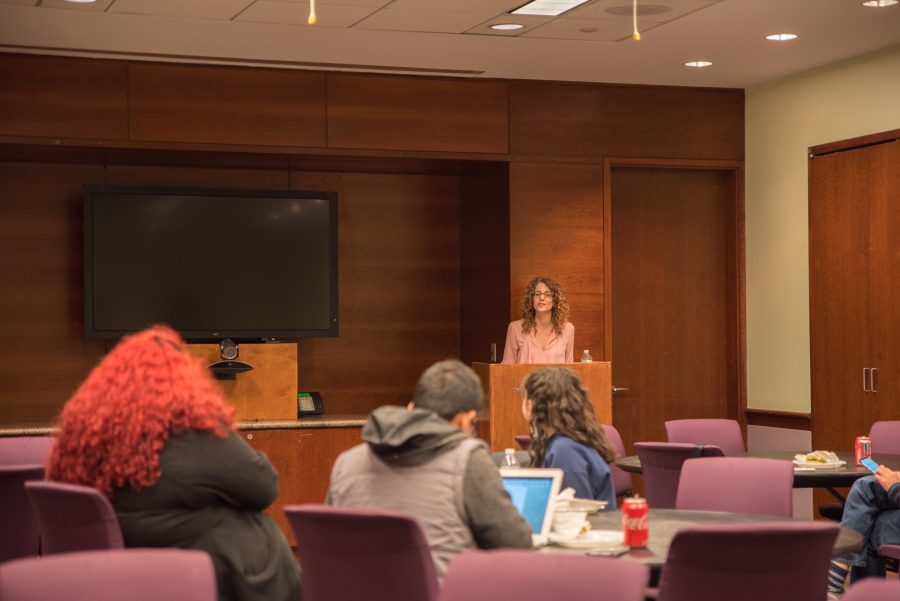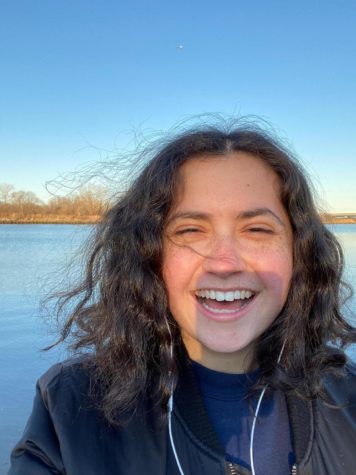Students learn about climate change prevention at seminar
May 6, 2019
The Baruch College Climate Change Faculty Seminar hosted a series of three discussions in April and May on different aspects of climate change, with the final talk occurring on May 1.
Each discussion of the sequence, called the “2019 Climate Change Speaker Series,” was centered around a speaker who the seminar invited to discuss the nuances of climate change.
After the speakers said their part, the audience — a combination of Baruch students, faculty and members of other CUNY schools — had the opportunity to ask questions and make comments related to the topic.
The final discussion, titled “Environmental Journalism and the Climate Crisis: The Stakes for Democracy,” was given by co-founder and executive editor of InsideClimate News Stacy Feldman.
The discussion delved into climate change denial and how deniers affect environmental reporting, which Feldman said is a shrinking field.
Feldman, a Columbia University alumna, warned the audience that if there is a lack of environmental reporting, it’s going to be even harder to get through to climate change deniers and get comprehensive legislation passed to curb the affects of global warming.
According to Feldman, environmental journalism has not been a widely accepted beat for a long time, though it is considered to have its origins in nature writing.
“The environmental journalist, it is really a unique species in our profession, and it is also a very recent arrival to journalism,” Feldman explained. “Journalism, as you of course know, goes back many, many centuries, so does nature writing, but the watchdog environmental journalists as we know, that really dates back to 1962 when a 55-year old marine biologist and author who was working for the U.S. Bureau of Fisheries as an editor at the time changed the world.”
This marine biologist, Feldman went on to say, was Rachel Carson, who wrote the book “Silent Springs” that was published in three parts in The New Yorker.
The book was on dichlorodiphenyltrichloroethane, or DDT, a pesticide commonly called the “insect bomb.” DDT became available for personal use during World War II. Carson exposed the pesticide’s danger to the environment and people’s health in her book, making the work the first piece of investigative environmental reporting.
Feldman spoke on Carson’s contributions to the field for a portion of time before moving on to discuss how psychology and politics intersect with environmental reporting and climate change solutions.
She said that there are “information bubbles” on the coasts of America, where there’s environmental reporting and climate change acceptance. Then, between the coasts, there is middle America, where environmental reporting is scarce and acceptance of climate change is even scarcer.
While national newspapers and magazines do heavy reporting on the effects of global warming, the local newspapers in the Midwest often stay away from the topic, as is it is not widely accepted in that area.
Unfortunately, according to Feldman, local papers are more trusted and read than national ones in this part of the country, so people living in the Midwest do not often get to read news stories on the environment.
This then perpetuates middle America’s disbelief in climate change and unwillingness to do something about it.
“Many people don’t trust [national publications] as much as their local papers. The national papers don’t speak to their local issues,” said Feldman.
“Or the study done by the Towel Center for Digital Journalism [in] Kentucky that surveyed a lot of people and found that people see national reporting as politically motivated. They feel there’s much less bias in their local papers, though they recognize our problems there, too. The big problem here are the local newspapers, and this is really, really the issue that we’re trying to deal with. They’re disappearing and that is creating new deserts all across the country, particularly in the middle of the country.”
After she finished her prepared speech, Feldman answered questions from the audience. One asked by someone who identified themselves as Luis inquired, “Do you think it’s a bit ironic that the reduction in the number of community and local papers you mentioned also means a reduction in the use of dead paper? Because most local papers are print and that’s regarded as a positive in climate change, the reduction of the use of paper.”
“I really don’t know the impact the newspapers have on the global deforestation problem,” Feldman replied.
The discussion was hosted by psychology professor Mindy Engle-Friedman, who introduced Feldman to the audience and teaches classes on environmental psychology.
Engle-Friedman is both part of the Climate Change Faculty Seminar and the chair of the Task Force on Sustainability, and she said that climate change impacts Baruch students in many ways.
“I think it affects students in different ways. To begin with I think that — just given my experience with students of Baruch in the classes that I’ve taught here — I think they don’t know that much about climate change,” Engle- Friedman said.
“I think it’s a gap, it’s a gap in their understanding and I think our students want to know stuff, but they don’t know it. And I think that that’s not a comfortable place for students to be. I don’t think it’s comfortable not to know. So, that’s number one,” the professor continued. “Number two is I think that they think it’s scary. It’s a scary topic. Why would you want to learn more about a scary topic?”
“So, that’s number two and number three is when they do know about it or they are aware, I think they’re really concerned about what could they do. Like, how could they possibly make a difference? I think that it affects the Baruch students because there’s a certain not knowing. And I think they’d like to know more,” she finished.









David Poulson • May 7, 2019 at 3:11 am
It’s a stretch to blame climate change skepticism on ill-informed Midwesterners, or to believe that environmental journalism is a rarity in flyover country. This is a statement more rooted in coastal bias than in any kind of rigorous study of media and the environment.